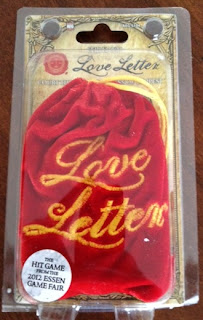So, after Essen last year, it seemed like everyone was talking about the little game Love Letter. And, since I often succumb to peer pressure when it comes to trying the new, "hot" game, I decided to give it a whirl.
In Love Letter, you start with a card in your hand. On each turn, you draw a card, discard a card, and you obey the text of the discarded card. Once the deck (of 16 cards minus a random one that you toss out each round) is exhausted, then the person with the highest card wins. You can also win a round by eliminating all of the other players. You play until a person wins a certain number of rounds, or you decide that you've played it enough. That's it. No more rules; the rest of the game is simply what the different cards do.
So, with all of that, Love Letter's greatest strength is this - it knows what it is, and it does that very well. Love Letter is a "micro game." It has barely any components, can be played in very little time, takes about a minute to teach, and basically has no setup. Yet, even with all of the factors that I just named, it is still an enjoyable experience (and many would argue that this is an "experience" more than a game). The game has a lot of luck, people might be eliminated before they even take a turn in any given round, and has a fairly low amount of strategy. Yet, we get back to this - it is fun to play.
 |
| It comes in fancy packaging, too |
I could continue rehashing very similar sentiments about what is good about the game, but I think that you are beginning to understand the crux of the pros. The first con is this - some people will hate this game. I mentioned earlier that some will view this more as an experience than a game. Those people (or any other people that really only enjoy strategic games) may hate this. There are too many ways to lose the game and so you don't have a feeling of controlling your own destiny. In theory, when you play a strategic game, the player with the best strategy will win more consistently than players with lesser strategies. I doubt that is the case with Love Letter.
 |
| You'll probably want sleeves - and check out that rule book! |
Overall, I give Love Letter an 8.5/10. I enjoy the game and will probably continue playing it as a filler in between other games - after all, when I can play a couple of rounds of Love Letter in the time that it takes my friends to clean up after their game, then I think we have found a great "filler" game.
If you're looking for light, quick games, then you might also check out For Sale, Monopoly Deal, and Tsuro.
I would like to thank AEG for providing me with a review copy of Love Letter.

I played love letter for the first time this week myself. I happen to be one of the people that hated it. I found it entirely too luck based and repetitive. Not a deduction game, as I was led to believe.
ReplyDelete